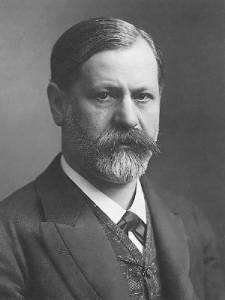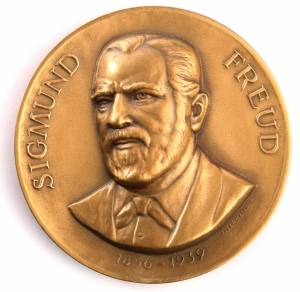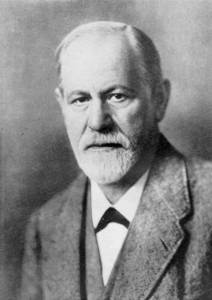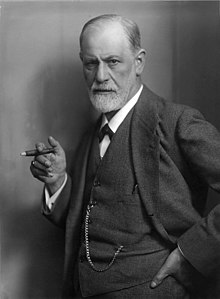One of the monster classes I took at the University of Texas in the early 1970s was Psychology 301. It included an overview of the writings and theories of the key figures in that field: B.F Skinner, Ivan  Pavlov, Jean Piaget, William James, Erik Erikson, Carl Rogers, Carl Jung, Alfred Adler and Sigmund Freud. I would venture that most of us undergraduates were vaguely aware of Pavlov and his tests with salivating dogs. But we certainly knew about Freud, the legendary founder of psychoanalysis.
Pavlov, Jean Piaget, William James, Erik Erikson, Carl Rogers, Carl Jung, Alfred Adler and Sigmund Freud. I would venture that most of us undergraduates were vaguely aware of Pavlov and his tests with salivating dogs. But we certainly knew about Freud, the legendary founder of psychoanalysis.
He was born of Jewish parents (in later adulthood, he referred to himself sardonically as a “shabby old Jew”) in 1856 in Freiburg, Austria. Freud earned a medical degree from the University of Vienna in his mid-20s, specializing in neuropathology. An affiliated professor, he set up a private clinical practice in 1886. Freud, his wife and children lived at 19 Berggasse in the city’s Alsergrund district. There he wrote, held meetings and saw patients for 47 years. He almost stayed too long before fleeing to exile in London because the Nazis were taking over. He died of mouth cancer in 1939; Freud, who smoked an average of 20 cigars per day (he favored Don Pedros and Reina Cubanas), rationalized that this habit facilitated his prodigious work schedule. He refused to stop burning stogies and denied that they were in any way problematic. On a somewhat related issue, Freud was an enthusiastic user and advocate of cocaine early in his career. Clueless about its addictive and destructive qualities, he gave it to his patients. He insisted that it would allow them  to more fully engage in “free association.” Cocaine—then an entirely legal, over-the-counter drug—is said to have heavily influenced one of his masterworks, The Interpretation of Dreams (1899).
to more fully engage in “free association.” Cocaine—then an entirely legal, over-the-counter drug—is said to have heavily influenced one of his masterworks, The Interpretation of Dreams (1899).
Freud was a smart guy, well-educated and quite sure of his role in exploring and elucidating human nature. His impact in the realm of psychology was nothing short of revolutionary. Indeed, his ideas permeate Western culture even today. But he’s not the messianic figure he purported to be. Psychoanalysis has fallen out of favor in academia, and few doctors of the mind use it today in clinical practice. It’s an outdated paradigm. And many of the things he did with his neurotic middle-class Viennese patients a century ago would bring charges of malpractice, lawsuits or even prison if he tried them now.
“Some of Freud’s cases just don’t stand up in light of historical fact,” said Anthony Stadlen, a research fellow at the Freud Museum in London. Stadlen and others have helped pull back the veil of secrecy surrounding Freud, and most of what is revealed is unflattering. His treatment of “Little Hans,” “Dora”  and “Anna O” was bad enough, but how about manipulating two patients (Horace Frink and Anjelika Bijur) into divorcing their spouses and marrying each other, so that he could receive a big financial reward? I am leaving out some sordid details from the scandal, which happened in the 1920s. His supporters managed to keep it quiet.
and “Anna O” was bad enough, but how about manipulating two patients (Horace Frink and Anjelika Bijur) into divorcing their spouses and marrying each other, so that he could receive a big financial reward? I am leaving out some sordid details from the scandal, which happened in the 1920s. His supporters managed to keep it quiet.
There were numerous other ethical breaches. This charlatan cooked data and engaged in what is—from a modern perspective—clearly pseudo-science. According to Dr. Frank J. Sulloway, “Freud’s case histories are rampant with censorship, distortions, highly dubious ‘reconstructions,’ and exaggerated claims.” He used rhetoric instead of empirical evidence and sought to convince readers and patients that his theories would not make sense until they abandoned their “resistance.” He was emphatic that only a person who had undergone psychoanalysis could become a psychoanalyst. Such education, if it may be so called, took place within privately controlled institutes and was not subject to peer review at universities and medical schools. I realize that life was different in the late 19th and early 20th centuries, but I cannot see how this did not raise red flags.
The young Freud, hostile to his father and jealous of his relationship with his mother, extrapolated that to all boys. Voila—the Oedipus complex! Boys are afraid of being castrated, leading to neurosis and conflict. Girls (all girls), in turn, envy boys for their male organs. Female hysteria, practically universal among distaff persons, derives from the vagina. As I read these things in my  textbook at UT, I was more than puzzled. I was outraged. I did not believe any of it and felt loathing for Freud. Feminists like Simon de Beauvoir, Betty Friedan and Shulamith Firestone have given the bourgeois arch-chauvinist both barrels, and they were right to do so. His thoughts on homosexuality now draw scorn. Although he still has his defenders, Freud these days is more ignored than disputed.
textbook at UT, I was more than puzzled. I was outraged. I did not believe any of it and felt loathing for Freud. Feminists like Simon de Beauvoir, Betty Friedan and Shulamith Firestone have given the bourgeois arch-chauvinist both barrels, and they were right to do so. His thoughts on homosexuality now draw scorn. Although he still has his defenders, Freud these days is more ignored than disputed.
I question the existence of the id, the ego and the superego if only because they were postulated by Sigmund Freud. How much did he do, really, to benefit people’s mental and emotional health? I will close with a quote from another of his many critics, Dr. Todd Dufresne: “Freud is truly in a class of his own. Arguably no other notable figure in history was so fantastically wrong about nearly every important thing he had to say. But, luckily for him, academics have been—and still are—infinitely creative in their efforts to whitewash his errors, even as lay readers grow increasingly dumbfounded by the entire mess.”


14 Comments
I didn’t expect that his mess would be covered like this. If I didn’t read this article I would remain illiterate of the entire truth. FREUD I was one of your admirers, such a disappointment😔.
DD, a lot of people are still under the impression that Freud was some super-great man who shone a light in the darkness. There is actually much more to this story, but I told enough.
What I remember most about Freud is his references to everything relating to sex. Now reading your article and finding out about his use of cocaine explains many things! I wonder how he explained his desire for cigars. Another thing I think about is the term – Freudian Slip. Thanks for opening my eyes to this charlatan.
So true. He just fabricated sex stories where they had no basis. And as for the cigars, he had a rather famous quote “Sometimes a cigar is just a cigar.” But he saw symbolism in virtually everything. Although he urged his patients not to rationalize, he did exactly that. What a phony.
A masterful job. You are so concise and full of relevant info. You are adroit at gleaning through superfluous data-points to present us with only the pertinent facts.
I wish that his wrong and radical viewpoints of human behavior could be erased from the textbooks. I agree with you that UT’s decision to expose all students to this invalid science depicted poor judgement
I loved that you quoted his professional peers who felt that he was a man of error which is the same camp of thinking I am in, namely he was full of error.
Furthermore, in my opinion, his science was not science but pseudo-mysticism, his medical training doesn’t seem to be medical at all, but unsupported prognostications of his own idiocy, respelled as id-iocy, that his behavioral science was not general science but a description of his own perversions, that he was not logical, but illogical, that there is no truth in his writings, just fantasies, that his view of parenting makes me cringe.
Thanks for the kudos, Gary. I wonder whether UT undergrads are presented with this stuff in the same way as in 1972. I agree that Freud was an “id-iot.” Good one, my dear sir!!
Sometimes I wonder how Freud would have made it as a football coach. Would he be like Knute Rockne or Barry Switzer? You, Richard, would have the answer.
Haha, not sure. But seriously, how was he taught when you were a student at Wake Forest in the 1960s? I hope everybody is more skeptical now. So much of what he said and did was bogus.
Until now, Freuds theory is being taught in Colleges and Universities here in the Philippines. Undergraduate and graduate students alike… this article is in fact an enlightenment on my part… It is good that you have done a great deal of reafing, research and shared this my dear bro. My salute , as always!
Thank you, Dr. Cornel. I read a biography of Freud, gathered things from the Internet and pondered this story for more than a year. I did not exaggerate because Freud is even worse than what you read here.
Richard, thanks for gathering the info and synthesizing into this short article. I hadn’t realized Freud was generally held in such low regard these days. There is probably some psychoanalytical label for this, and it probably does not come as a surprise, but now I am curious about the “dirt” you didn’t mention. Maybe your next article?
John: I just remember those days at UT, reading about how “all” girls had johnson envy, and how “all” boys were afraid of castration, desired their mothers and wanted to kill their fathers, and I knew it was a bunch of hooey. I submit that Freud himself needed a shrink!
Wonderful article. I lost interest when being exposed to and expecting to learn and understand the id, ego and supergo. Huh? But the Oedipus Complex truly made me suspicious of anyone practicing in the field of psychiatry, psychology, etc. I have always considered Sigmund a Freudian slick. Thanks, Richard. Keep em coming.
very good and enlightening, enjoy learning new fact about Sigmund Freud
Add Comment